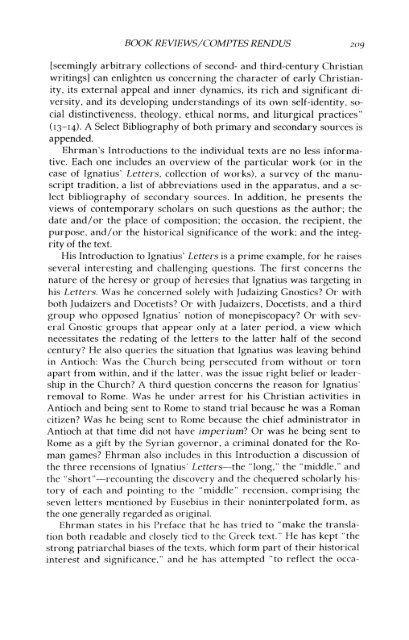MOUSEION - Memorial University of Newfoundland
MOUSEION - Memorial University of Newfoundland
MOUSEION - Memorial University of Newfoundland
You also want an ePaper? Increase the reach of your titles
YUMPU automatically turns print PDFs into web optimized ePapers that Google loves.
BOOK REVIEWS/COMPTES RENDUS 2°9<br />
[seemingly arbitrary collections <strong>of</strong> second- and third-century Christian<br />
writings] can enlighten us concerning the character <strong>of</strong> early Christianity.<br />
its external appeal and inner dynamics. its rich and significant diversity.<br />
and its developing understandings <strong>of</strong> its own self-identity. social<br />
distinctiveness. theology. ethical norms. and liturgical practices"<br />
(13-14). A Select Bibliography <strong>of</strong> both primary and secondary sources is<br />
appended.<br />
Ehrman's Introductions to the individual texts are no less informative.<br />
Each one includes an overview <strong>of</strong> the particular work (or in the<br />
case <strong>of</strong> Ignatius' Letters. collection <strong>of</strong> works). a survey <strong>of</strong> the manuscript<br />
tradition. a list <strong>of</strong> abbreviations used in the apparatus. and a select<br />
bibliography <strong>of</strong> secondary sources. In addition. he presents the<br />
views <strong>of</strong> contemporary scholars on such questions as the author; the<br />
date and/or the place <strong>of</strong> composition; the occasion. the recipient. the<br />
purpose. and/or the historical significance <strong>of</strong> the work; and the integrity<br />
<strong>of</strong> the text.<br />
His Introduction to Ignatius' Letters is a prime example. for he raises<br />
several interesting and challenging questions. The first concerns the<br />
nature <strong>of</strong> the heresy or group <strong>of</strong> heresies that Ignatius was targeting in<br />
his Letters. Was he concerned solely with Judaizing Gnostics? Or with<br />
both Judaizers and Docetists? Or with Judaizers. Docetists. and a third<br />
group who opposed Ignatius' notion <strong>of</strong> monepiscopacy? Or with several<br />
Gnostic groups that appear only at a later period. a view which<br />
necessitates the redating <strong>of</strong> the letters to the latter half <strong>of</strong> the second<br />
century? He also queries the situation that Ignatius was leaving behind<br />
in Antioch: Was the Church being persecuted from without or torn<br />
apart from within. and if the latter. was the issue right belief or leadership<br />
in the Church? A third question concerns the reason for Ignatius'<br />
removal to Rome. Was he under arrest for his Christian activities in<br />
Antioch and being sent to Rome to stand trial because he was a Roman<br />
citizen? Was he being sent to Rome because the chief administrator in<br />
Antioch at that time did not have imperium? Or was he being sent to<br />
Rome as a gift by the Syrian governor. a criminal donated for the Roman<br />
games? Ehrman also includes in this Introduction a discussion <strong>of</strong><br />
the three recensions <strong>of</strong> Ignatius' Letters-the "long." the "middle," and<br />
the "short"-recounting the discovery and the chequered scholarly history<br />
<strong>of</strong> each and pointing to the "middle" recension. comprising the<br />
seven letters mentioned by Eusebius in their noninterpolated form. as<br />
the one generally regarded as original.<br />
Ehrman states in his Preface that he has tried to "make the translation<br />
both readable and closely tied to the Greek text." He has kept" the<br />
strong patriarchal biases <strong>of</strong> the texts, which form part <strong>of</strong> their histodcal<br />
interest and significance." and he has attempted "to reflect the occa-

















